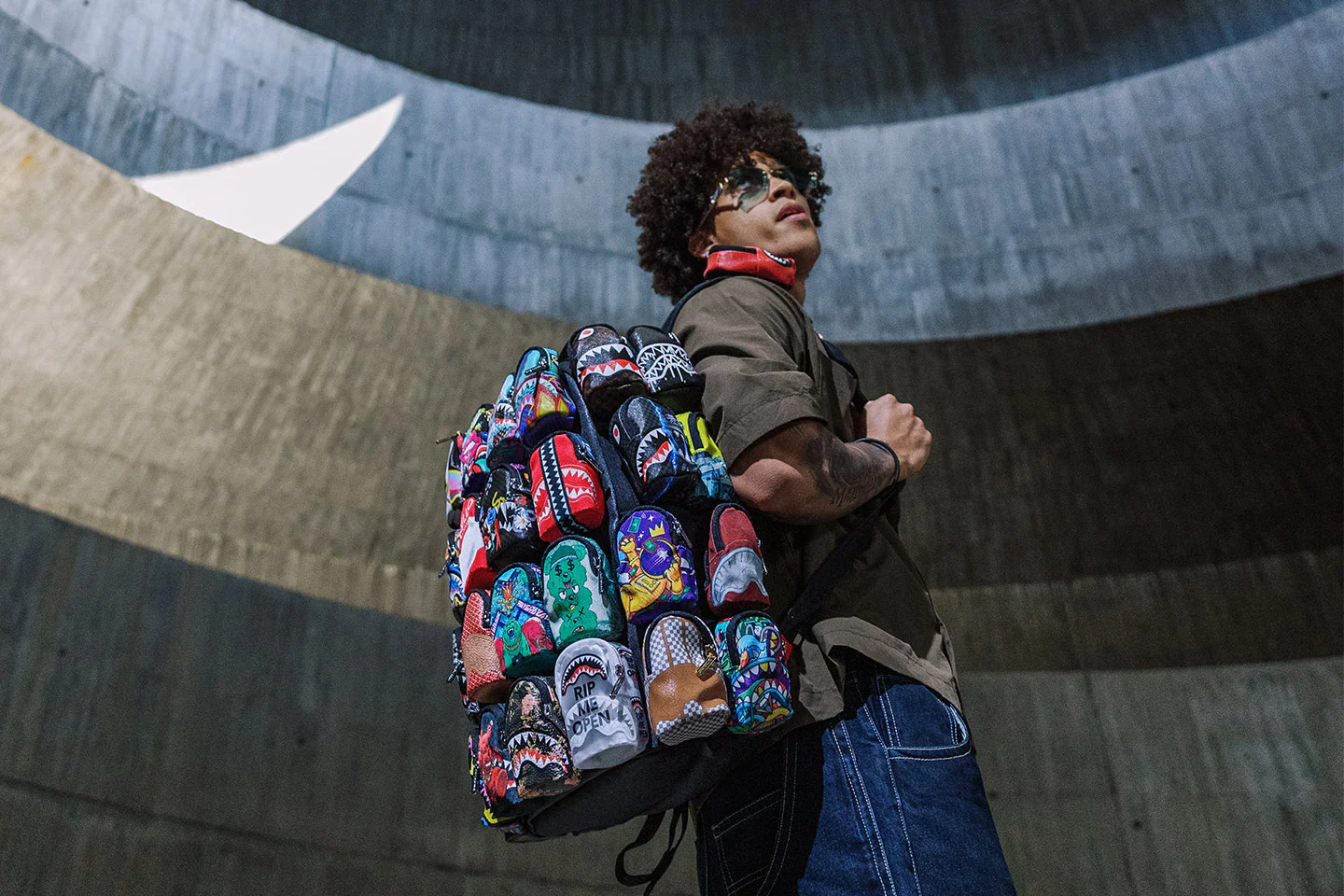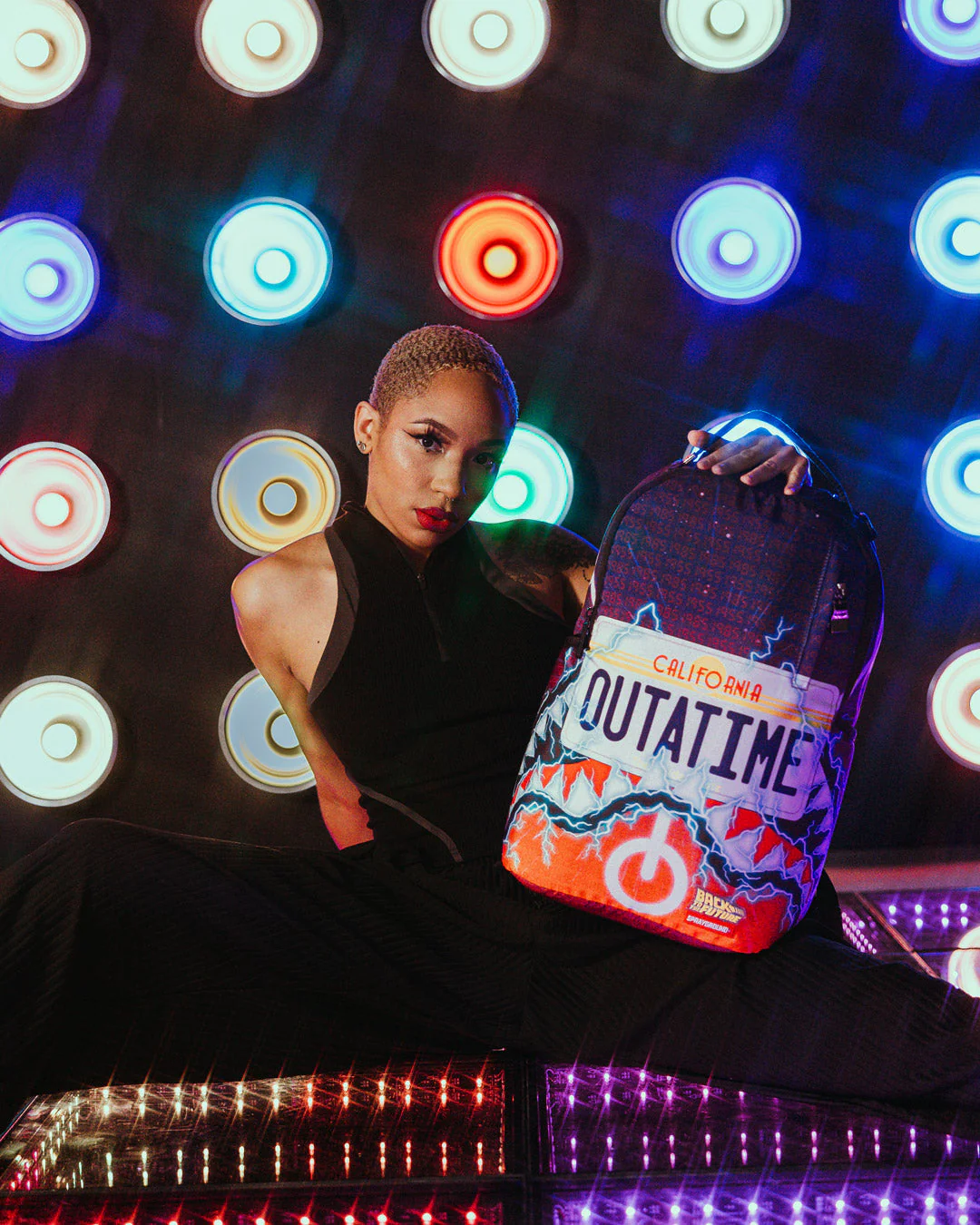Why Every Twelve-Year-Old Wants a Sprayground Backpack
Images courtesy of Sprayground
On a sticky July morning, tweens around the world—phones primed, Crocs squeaking—will pace back and forth as they wait for Sprayground’s latest product drop. The item in question? A colorful, limited edition backpack splattered with anime eyes and ringed by the brand’s now-canonical shark grin. Within minutes, the $100 bags will be gone, destined for hallway bragging rights or a quick flip on Depop.
Fifteen years earlier, Sprayground’s founder David Ben-David sold his shark-toothed packs from a rented SUV during Miami’s Art Basel. This past fall his bags stomped Milan Fashion Week, 47 crystal-studded looks trailing LED drones, then landed in Vogue Italia and Condé Nast Traveler, confirmations that the graffiti oddity had become fashion cargo cult.
The coup de grâce came last month: a $500 15th-anniversary pack, “All the Bags in the World,” limited to 100 units and vaporized in under two minutes. Parents slammed refresh buttons; kids screenshotted the tombstone “Sold Out Forever” banner as proof of purchase—or proof of pain.
‘All the Bags in the World’ Limited Edition Bag | Images courtesy of Sprayground
Sprayground’s website tells you the rest: “All bags are limited edition & never produced again.” New drops land every few days, each immortalized by that “Forever” epitaph once the last carton ships.
In practice the policy converts an $80-to-$150 piece of nylon into a floating currency with resale data showing limited SKUs trading at two to three times retail inside 48 hours. Stock markets reward scarcity and apparently so do sixth-graders.
For Gen Alpha, the cohort of kids born between 2010 and 2024, those disappearing lines are more than a marketing trope. Developmental research shows five- and six-year-olds already infer desirability from supply-and-demand cues, valuing items that vanish quickly over those that linger on shelves. In other words, the kids are understanding the rules of limited inventory before they multiply fractions in school.
Beyond scarcity, Sprayground’s edge is range. Open the brand’s collaboration page and you drown in IP: Back to the Future, Minecraft, Porsche, Peppa Pig, Bleach, The Met, Dragon Ball Z—more than 150 partnerships splinter across styles, colorways and holographic appliqués.
BACK TO THE FUTURE OUTATIME DLXSR BACKPACK
For a generation whose media diet looks like a shattered kaleidoscope, Sprayground’s genius is to treat that fractured fandom not as chaos but as inventory strategy: whatever niche your kid obsesses over this month, there’s a shark-mouth mash-up to match. The time-boxed runs create urgency, while the IP carousel means parents can pay for nostalgia at the same register their children pay for novelty.
The numbers behind the flash bulbs are no less real. Fortune Business Insights projects the global backpack market will climb from $20.3 billion this year to $37.45 billion by 2032, a 9 percent CAGR fueled largely by youth streetwear.
Within the U.S., back-to-school shopping now starts in June, with 67 percent of families beginning before July Fourth, because tariff fears and early-bird discounts reward speed over deliberation. Retail calendars have moved up; so has hype.
Yet scarcity is fickle. Stanley, once the toast of water-bottle TikTok, already polls as a trend “on the way out.” Sprayground’s shark grin risks similar saturation. For the moment, though, the lesson stands: value now lives in the gap between inventory and refresh rate, and Gen Alpha is fluent long before their first econ class.
Sprayground has weaponized that fluency, turning a backpack into a stock ticker, a hallway into a trading floor, a Saturday morning into a crash-course in modern capitalism. With the next drop already coded into Shopify and a legion of twelve-year-old fingers hovering over “add to cart,” scarcity has never been so abundant.





